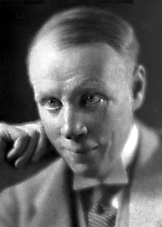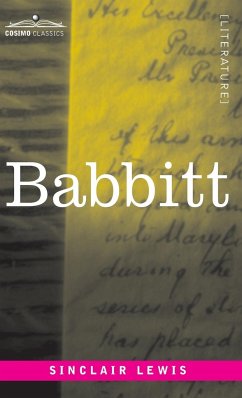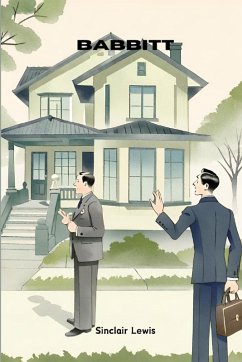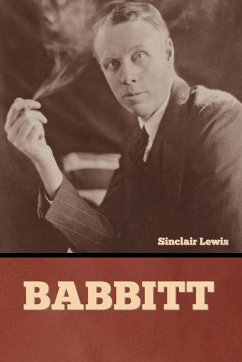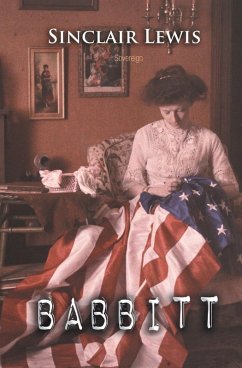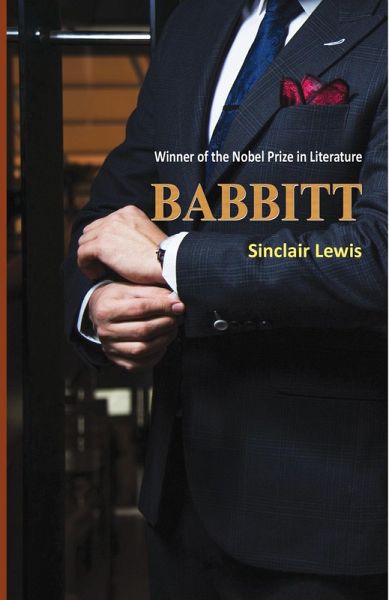
Babbitt
Versandkostenfrei!
Versandfertig in 1-2 Wochen
21,99 €
inkl. MwSt.

PAYBACK Punkte
11 °P sammeln!
George F. Babbitt is described as a middle-aged man and successful realtor, who sells houses at rates that exceed what people are actually able to pay for them. Lewis explains Babbitt's morning routine with meticulous detail, down to his high-tech alarm clock, which he views as a marker of social status. He is proud of his house in Floral Heights, as it is standardized from the architecture to the atmosphere, which appeals greatly to Babbitt. The first seven chapters of the book follow Babbitt over the course of a single day, examining how he dresses with each article of clothing perfectly cur...
George F. Babbitt is described as a middle-aged man and successful realtor, who sells houses at rates that exceed what people are actually able to pay for them. Lewis explains Babbitt's morning routine with meticulous detail, down to his high-tech alarm clock, which he views as a marker of social status. He is proud of his house in Floral Heights, as it is standardized from the architecture to the atmosphere, which appeals greatly to Babbitt. The first seven chapters of the book follow Babbitt over the course of a single day, examining how he dresses with each article of clothing perfectly curated. At work, he spends most of his time and energy on activities with the goal of climbing the social ladder. He closes a deal by forcing a poor businessman to buy a piece of property at more than twice its value. This gives him a sense of pride, as he pockets his earnings, feeling that he has done a good job. He picks up the phone to call his best friend, Paul Riesling, to ask him to lunch. Paul is a talented musician and should have been a violinist but has gone into the tar-roofing business in order to provide for his wife, Zilla. She is always stirring up trouble, antagonizing men she believes to be below her social status, and then enlisting Paul to come to her rescue to fight them like a man. At home, she demeans him, accusing him of being a coward and a weakling. Babbitt is saddened observing the relationship between his friend and his wife, so much so that he suggests the two of them take a vacation to Maine, away from their wives. Paul is skeptical, but Babbitt uses his powers of persuasion, assuring Paul that he will arrange the whole thing. Back at the office, Babbitt refuses a raise to one of his employees. He then goes home to his wife, and the two decide to throw a flamboyant dinner party, which is a resounding success. All of Babbitt's friends are just like him, and together they stuff themselves on rich food and get drunk on Prohibition-era gin, before going home to nurse their hangovers. Babbitt and his wife stop by to visit Paul and Zilla, who immediately starts berating her husband. This leads Babbitt to tell her that she is a nagging and terrible wife to Paul, and he insists that she allow him to go to Maine. Zilla consents. Myra, Babbitt's wife, accuses him of bullying Zilla, and he tells her to mind her own business. Paul and Babbitt head off on their journey to Maine by train, where they are surrounded by other like-minded businessmen who express their concerns about the price of motorcars and oil and the growing threat of communism. After returning to Zenith, Babbitt is invited to speak at a real estate conference in the neighboring town of Monarch. In the speech, he proclaims that real estate agents should be looked upon as professionals and referred to as realtors. He also states that Zenith is the best place in the world, quoting various statistics to back up this claim. His speech is a resounding success and he is immediately recognized as an orator. He later takes a business trip to Chicago, where he sees Paul having dinner with a beautiful middle-aged woman. He later confronts his friend about what he has seen, and Paul confesses that he can no longer stand to live with Zilla. Babbitt promises to keep his friend's secret; he is secretly envious of his newfound independence. One day, he is at the office when he receives a call from his wife telling him that Paul has shot his wife and that Zilla is in the hospital and Paul is in prison. Babbitt feels that his world is collapsing around him, triggering him to go off the rails, adopting a more bohemian and free-spirited way of living. His faith in the almighty dollar has been demolished, and in its place, he has a newfound respect for the importance of living a life of freedom and integrity.



